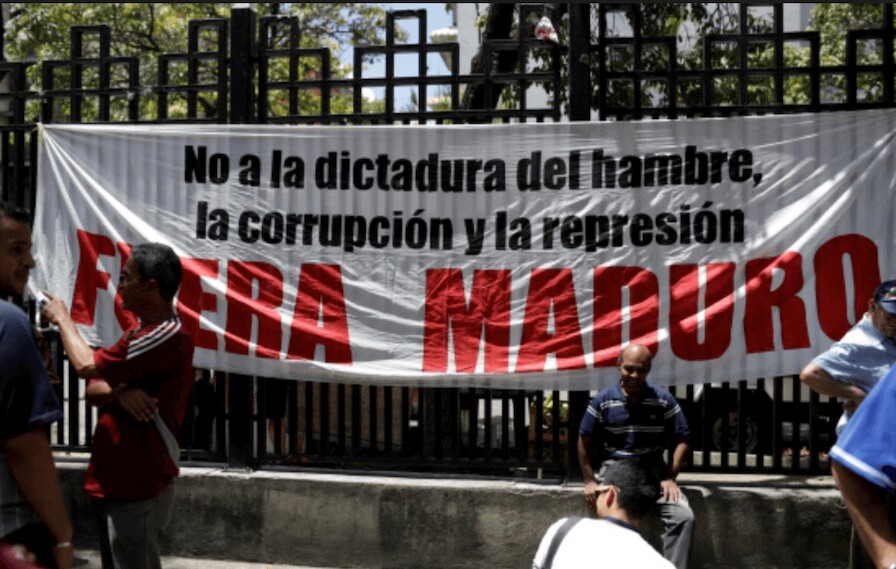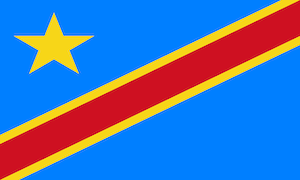March 23, 2018

Photo: Venezuela opposition banner reading “No to the dictatorship of hunger, corruption, and repression. OUT MADURO”

Four Venezuelan officials have been blacklisted by the United States, part of a new set of targeted sanctions against the South American country’s government. The four were all players in Maduro’s political network, and each was connected to allegations of graft and corruption. Any assets within US jurisdiction will be frozen, and any Americans are forbidden from engaging in any financial transactions with the individuals. Also included in this expansion of sanctions was a ban on Venezuela’s cryptocurrency introduced last month by Maduro. US Treasury secretary Steven Mnuchin lambasted the currency as Maduro’s attempt to maneuver around previous sanctions. The sanctions did not include any restrictions on Venezuela’s oil sector, as the US worries targeting oil would only deeping the suffering of Venezuelan citizens. The Venezuelan government however, has no such reservations. This week an ex-oil refinery boss of the state-owned company PDVSA was arrested and accused of corruption. This arrest joins dozens of others as the government cracks down on the oil sector. The opposition has called the arrests nothing more than a power struggle within the government.
In other news, several protests across the country were held over the weekend against the May presidential elections. They were organized by the Broad Front for a Free Venezuela, made up of the opposition coalition MUD, leftist dissidents, and some civil society groups. Parliamentarian Delsa Solorzano says “The assemblies are a show of resistance against a regime that wants to deny us our rights. We have to salvage the right to vote freely.” Another protest, not coordinated by the Broad Front, took place on Thursday when frustrated citizens vandalized a statue of Chavez. They gathered in a town square in the early morning, burning tires over power cuts and unpredictable food supplies in the region.

Mexican citizens can, for the first time, register to vote absentee while in the US for a presidential election. This has led to a flood of people trying to make registration appointments, and the Dallas consulate is overwhelmed by immigrants from Mexico trying to register before March 31 deadline. Originally, the consulate said it had reached its maximum number of appointment slots two full weeks before the deadline and was forced to book applicants into April, past the deadline. After an incensed response by the Mexican community in the area, the consulate has expanded its appointments by extending its hours and setting up temporary locations, nearly doubling the amount of appointments it can offer. Some Mexican citizens worry that the government failed to prepare itself for the increase registrations because many Mexicans in the US are expected to vote for Lo?pez Obrador, competition for the ruling party’s candidate Meade.
On that note, voter opinion polls show conflicting leads for Lo?pez Obrador, ranging from 5 percentage points to 18 points, with Anaya in second place in most polls and ruling party candidate Meade trailing in third. Following a discovery by the National Electoral Institute of falsified signatures from two independent candidates, only one independent remains in the race: right-wing politician Margarita Zavala. This, together with Anaya’s corruption scandal, could pull Anaya from second place and set Meade against Lo?pez Obrador.
Separately, Nieto’s presidency has reached the highest recording of violence against journalists— often committed by state officials, according to the human rights group Articulo 19. The numbers have reached 2,000 attacks and 41 murders during his six year term, representing a more than 200% increase from 2012.

Myanmar’s government is considering legislation that would allow greater oversight of work done by international bodies such as INGOs and UN missions. This has sparked concern that the country would crackdown more harshly on their activities, and is part of a trend by governments in Southeast Asia to limit civil society.
Myanmar’s civilian president Htin Kyaw has announced his resignation due to deteriorating health. He was a close friend of Aung San Suu Kyi and his role was more ceremonial, since Suu Kyi continues to function as the country’s de facto leader. He will be replaced by Win Myint, a longtime member of the ruling party and Aung San Suu Kyi loyalist, who was just elected to be the third Vice President. The new president will have little impact on the overall governance of the country and continue to act as nothing more than a figurehead. In the interim the more senior of the VP’s, the military’s appointment Myint Swe, will rule until parliament officially elects a new leader. Myint Swe is a retired general, and previously headed the military intelligence agency under the junta rule, and many in the civilian government’s ruling party are wary of what actions he may take during his brief time in office.
This Wednesday marked the 100th day since two Reuters reporters were arrested and accused of violating the Official Secrets Act, and the 11th time they appeared in court.

Government forces killed at least 47 people during protests in the DRC against Kabila last year. A UN report released this week called this an attempt by the government at “quashing dissent at all costs.” This crackdown on peaceful protesters threatens the prospect of peaceful elections, which are set to be held in April 2019. The date is already a much-delayed reschedule, coming after Kabila refused to step down from power in December. Meanwhile, Kabila denies that his security forces have used excessive force on the protesters. The UN report, on the other hand, details numerous accounts of the lethal force used and the force’s attempts to cover up the consequent human rights violations, including removal of victims’ bodies and preventing access to domestic or international observers.
Also this week, the UN Security Council humanitarian needs resulting from conflict in the DRC have doubled in the past year. They estimate that approximately 13 million people are affected, requiring humanitarian assistance, including 4.6 million acutely malnourished children. “We’re seeing mushrooming epidemics including the worst outbreak of cholera in 15 years. There’s also an epidemic of sexual violence — most of it unreported and unaddressed — and much of it against children.” The UNSC cited underfunding as the single biggest impediment to humanitarian response in the country.

Trump has replaced his national security advisor Lt. Gen. H.R. McMaster with John Bolton, his third national security chief in 14 months. Bolton has been in Republican circles for decades, serving under Reagan and both Bush administrations. His track record is one of hawkish opinions and a willingness to intervene, and a diplomatic style described as abrasive. Bolton and Trump are on similar pages regarding Iran, and the country appears to be “heading toward a much more confrontational relationship with the Islamic Republic.” Their opinions diverge more on North Korea, with Bolton fully supportive of a pre-emptive strike against the Asian country. He has nonetheless stated that Trump’s scheduled diplomatic meeting with Kim Jong Un will not be within the “norms of traditional diplomacy” for which Bolton has expressed disdain.
Trump’s lawyer John Dowd resigned on Thursday, after Trump signaled his willingness to sit down with investigators, against Dowd’s advice. The team of lawyers handling this investigation is now populated more by TV personalities than by cautionary forces like Dowd, which will allow Trump to act how he wishes and “embrace a more aggressive posture” toward the inquiry.
Trump this week also announced plans to introduce tariffs up to US$60 billion on imports from China. China has retaliated with its own tariff proposal of 15% import tariffs on over 100 types of US products, like fruit, wine and steel pipes, worth US$977 million.
Maldives – President Abdulla Yameen has finally lifted the 45-day state of emergency in the country. Earlier this week, security forces arrested former president Gayoom, two supreme court judges, and a top judicial administrator. They were all charged with terrorism. – Al Jazeera
South Africa – Jacob Zuma is now to face 16 counts of corruption from the 1990s, after being forced by his party to resign from the presidency last month. – BBC
Russia – Vladimir Putin secured a fourth presidential term this week, winning the election by more than 75%. He received congratulations on his reelection from leaders of China, Saudi Arabia, Iran, Venezuela, Bolivia, Cuba, and later the US. – CNBC
Nigeria – Boko Haram has freed almost all of the 110 schoolgirls kidnapped last month. The information minister of Nigeria reported that no ransoms were paid, but rather that the release was achieved “through back-channel efforts and with the help of some friends of the country.” – Al Jazeera
Cambodia – Cambodia’s UN representative has rejected a statement by 45 countries calling for free and fair elections and criticizing the Cambodian government’s treatment of the main opposition party. “These backward steps include signs of escalating repression of the political opposition, civil society and media,” said the statement, but the Cambodian ambassador dismissed the concerns as being politically motivated. – Washington Post
Colombia – Activist Juan Mena was shot and killed while walking in public in Quibdo, Choco. He had recently returned to the area after fleeing death threats made against him. – TeleSUR
Bolivia – The police and coca growers clashed violently on Tuesday when the police barred the growers from a legal coca market. The growers responded with force, lighting sticks of dynamite and throwing stones at police cars. Officers used tear gas to disperse the rioters and took at least five people into custody. – LA Herald Tribune
Peru – President Kuczynski offered his resignation after videos allegedly showing his allies trying to buy off an opposition lawmaker were released. However, he has taken issue the wording of a congressional resolution to accept his resignation, and is threatening to remain, forcing congress to continue with a slow impeachment process. – ABCNew
Philippines – President Duterte has called for a mass withdrawal from the Rome Statute and the ICC. This is not expected to interfere with preliminary examinations of Duterte’s violent drug crackdown. Also, Chief Justice Maria Lourdes Sereno is in danger of being impeached by Congress, ostensibly for over 25 different reasons. Some, however, believe she is being removed for her outspoken criticism against the government’s war on drugs. – Reuters | Economist
Syria – A remaining group of rebels in Eastern Ghouta have announced a ceasefire to begin talks with the Russian military to allow for the safety of civilians – BBC
Murder of Brazilian Activist Brings People Power out in Force
The recent murder of Brazilian human rights activist and Councilwoman Marielle Franco has deeply shaken the communities she advocated for. More than a thousand people have taken to the streets of Rio de Janeiro in protest of not only her killing, but also its suspicious and abhorrent context. By mourning her loss, their voices prove something important: She was not alone.
Farmers in India March For Six Days For Change In Agrarian System
Farmers in India are tired of a failing system and an unresponsive government. Over 45,000 people marched for six days until they reached Mumbai, where they were greeted by supportive community members, and presented their demands to state ministers. The government listened to their demands, and when the protestors returned home, they had promises of change on 100% of their demands.